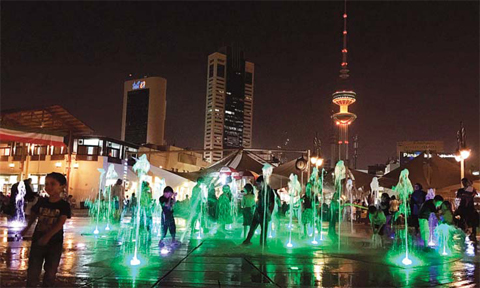KUWAIT: Kuwait, in its quest to honor His Highness the Amir Sheikh Sabah Al-Ahmad Al-Jaber Al-Sabah's vision to be a regional financial and commercial hub, has opened its doors for foreign investment to further promote already-active business environment. There are huge investment potentials in Kuwait, where the government and parliament have issued new laws making it easy for foreign investors to do business in Kuwait.
Potential is enormous
"Potentials are enormous," said Matthew Lodge, British Ambassador to Kuwait. His brief, yet significant, remark came in a video that shed light on investment opportunities in Kuwait. The video, boasting the fact that Kuwait has a strategic location, stable government and vibrant economy, would be displayed on British Airways Media on board international long-haul flights during the month of July this year, a period usually witnessing an increase in passengers.
The video, "Kuwait... Discover the Opportunity," would feature speakers from government and private sectors, in addition to the Speaker of the National Assembly, or parliament. All highlighting business opportunities in the country through lucrative laws and legislations. Speaker Marzouq Al-Ghanim, highlighted the fact that the constitution of Kuwait set the foundation for a stable political regime. "The constitution is the oldest in the region, and in order to develop any country you need political stability," said Al-Ghanim in the video, which highlighted changing economic and investment climate in Kuwait.
The constitution guarantees this stability through many means, including freedom of speech and expression. "The freedom of speech in Kuwait and press in Kuwait in the highest in the region," Sheikh Dr Mishal Jaber Al-Ahmad Al-Sabah, Director General of Kuwait Director Investment Promotion Authority (KDIPA), said. "The government and parliament worked in past few years and presented favorable measures to enhance business environment to create other forms of income," he said in the video, which also showcased the modern lifestyle and vibrant city life. The government and parliament approved a new law that brings public-private-partnership (PPP), paving way for foreign companies to fully own projects inside Kuwait.
30 days or less
KDIPA helps foreign multi-national companies to establish a business in 30 days or less. The Partnerships Technical Bureau (PTB), established in 2008, is responsible for PPP projects' implementation. PTB aims to utilize private sector skills and expertise to maximize value for money and service quality in different sectors. Kuwait had embarked on over $100-billion development plan, which included mega projects, including in sectors of transport, energy and communications. "We know we can't get where we want to be without investment and help of our friends and partners," Sheikh Mohammad Abdullah Al-Mubarak Al-Sabah, Minister of State for Cabinet Affairs, said in remarks in the short video, inviting foreign companies to "come to Kuwait."
Chairman of Kuwait Chamber of Commerce and Industry (KCCI) Ali Al-Ghanim, said the new laws approved by the parliament and government allowed foreign investors to fully own business without need to have Kuwaiti partners. Saad Al-Ali, Deputy Director General for Editorial and Chief Editor of Kuwait News Agency (KUNA), said that a "lot of our development projects are done in partnership with foreign companies." These companies, he added, "must understand the needs for Kuwaiti projects." Sheikha Al-Bahar, Deputy Group CEO, National Bank of Kuwait (NBK), pointed out that the culture in the country was changing. "We are well prepared to create the best business environment for international companies, and the opportunities are huge," she added.
History of mercantilism
Trading and doing business are deep-rooted in the culture of Kuwait. People used to trade in commodities, woods and pearls before discovery of oil, which allowed them to open up to different business environments. "It is the culture of trading, culture of openness," said Sheikh Dr. Mohammad Sabah Al-Salem Al-Sabah, Former Deputy Premier and Foreign Minister.
Megaprojects
The video talked about giant PPP project in Kuwait, like Shamal (North) Al-Zour power station with USD 1.8 billion on first phase out of five stages aimed at honoring growing electricity and water demands caused by increasing population. It also highlighted Sheikh Jaber Al-Ahmad Causeway project, which was on track for completion in 2018. A proposed $7 billion metro was on track. Plans to build a new terminal at Kuwait International Airport are set to increase passengers' capacity from five to 10 million each year.
An ambitious $16 billion Mubarak Al-Kabeer Port, north of Kuwait, would handle 3.6 million Twenty Foot Equivalent Units (TEUs) each year. Sheikh Jaber Al-Ahmad Culture Center would be a district for a variety of cultural activities. The timing of the video display, which would be in July, was because this month witnessed 20-40 percent increase of passengers from the Gulf Cooperation Council (GCC) countries and it was also the peak travel time in Europe, said Lawrence Ireton, country director of QCPTV, the company that produced the film. "The aim is to get understanding of these people of different nationalities to see the business environment in Kuwait from a wider perspective," he said.
Changes
The changes in the six GCC countries, including Kuwait, "signify need of foreign firms, and in Kuwait there are companies like IBM, GE and Huawei already operating," he added. Ireton noted that these international firms were making use of the PPP law, which he described as "the most unique in the GCC countries." IMB offers information technology services and solutions for local market. Huawei was contributing to non-oil sector in Kuwait, which was considered the highest mobile penetration in the region. The government and parliament of Kuwait are also promoting all measures needed to further boost foreign investment. "I see a lot of changes in legislation for benefit of the economy, this will give push for Kuwaiti companies and foreign companies to come and put their money for investment, because the opportunities are attractive for local and foreign investors," said Wafa Al-Qatami, Vice-Chairman of KDIPA and Board Member at KCCI. - KUNA











